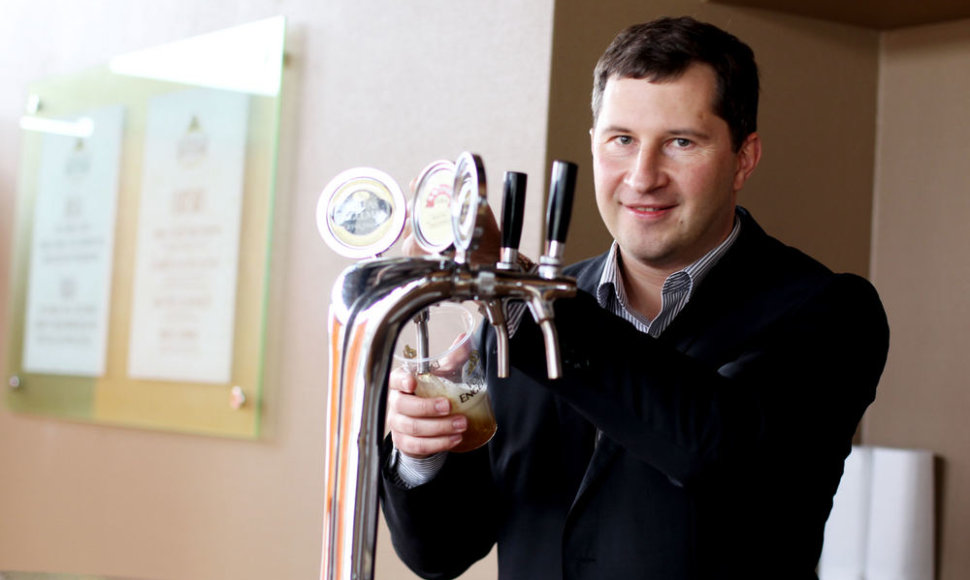This year, Volfas Engelman turnover is expected to total 120 million litas (35 million euros), or 17 percent more than last year. It is a little too early to speak of profits, but, notes Horbačauskas, the brewery might be subject to profit tax for the first time in quite some time.
The company takes up 14.5 percent of the Lithuanian beer market and is firmly established as number three brewery in the country. Among its strongest brands are Volfas Engelman, Fortas, Heineken beers and, as of the New Year, the company is adding the celebrated German Warsteiner brand to its portfolio. Exports have nearly doubled, too, mostly to Great Britain, Germany, Poland, and Russia.
- For quite some time, other players have viewed your company as a lame duck of the market, failing to slice a significant share of the pie. What helped you spring to the top?
- Our previous name, Ragutis, was not a strong brand, burdened, as it were, by a trail of Soviet and poor-quality associations. So a turning point was when the brewery regained its historic name, Volfas Engelman, in April 2011.
We turned back to our roots, brought forth the authenticity, improved the quality of our beers, package design - and all that convinced consumers to give us a chance. The history of Volfas Engelman brewery is a story of success - between the wars, it took up half of the market in Lithuania.
And now Volfas Engelman is once again a sign of historic heritage and respect for tradition. Kaunas in particular believes in us - we have over 20 percent of the market in Kaunas region, making us number two brewery. So far, we are doing worst in Klaipėda region, with 10 percent and the third position.
This image of being "the third loser brother" was what helped us jump upwards. Our competitors did not take us seriously, failed to appreciate the potential. Some of them might have simply rested on their laurels for too long.
- And that is an absolute don't in this business?
- Growing one's market share and sales is a slow and difficult process, while losing it can happen in no time. Should you fail to negotiate a deal with a retailer, or a competitor cuts the price while you don't - and that's that.
As one Russian entrepreneur once put it, you must run in this business just to stay where you are. You miss one chance - and part of your market share is gone.
- Your "Bravoro pinta" ("Brewery Pint") product could justifiably be called discovery of the year.
- The glass-bottled "Bravoro pinta" took 1 percent of the entire beer market within four months of its launch. It exceeded even our wildest estimates and hopes. At one time, the glass plant could not keep up with the demand for bottles.
But it took one year after we came up with the concept until we could ship the product to the stores. German designers worked on the bottle design alone for eight months - a premium product must look well on the shelves. The more expensive the brand, the more attention one must pay to details, so that they reinforce one another and tell a consistent story.
- It seems that marketing is more important than taste in the beer business?
- Beer is a product that is particularly imbued with human emotions. In other words, the taste does not originate on one's tongue but rather in one's psyche. Image is therefore crucial in this business - you must make sure that your story is more convincing to the consumer than that of your competitor.
- One can hear beer drinkers often reproach: this is diluted; or say beer drink instead of beer. "It was good at first, but then got worse, producers must be saving," etc.
- I seriously doubt if producers of premium beer would dare risk their reputation by toying with quality. Any reputable brewer will own labs where they check production parameters. Each batch gets thoroughly inspected and, should it fail to meet the standard, it is withheld from the market. I can assure you that there is no variation in quality parameters when it comes to serious brands.
It is somewhat more difficult to assure stable quality in bars, as much depends on the particular pub - on where they keep the beer, how they cool it, how they pour it into glasses.
To a great extent, however, human psychology plays a part. Few of us could probably distinguish brands in a blind test.
- If I were working in your brewery, could I be expecting a raise following excellent sales?
- Sure, when one hears that 2012 was the best year in the history of the brewery, the first thing that comes to mind is, what's in it for me? But it's more complicated than that. Our current results are just a minimum and very fragile target that our shareholders want to achieve. It is not, however, quite what they hope and aim for. 80 million litas have been invested into the company over the past 12 years.
However, it's not all about an extra 100 litas, right? An employee cares about working at a prestigious company, about stability, continuity, social guarantees. Perhaps your salary will not rise very quickly here, but it will be guaranteed for years to come.
Besides, we take good care of our employees daily - by improving working conditions, installing changing rooms, kitchens, etc. We nurture loyalty and the community spirit: we throw Christmas parties and sports festivals for our employees and their families.
We are a good employer, salaries are above the average. A CEO must, however, find the right balance among interests of shareholders, clients, suppliers, and employees. I have a small "blanket" and it must keep as all warm.
- Have you ever considered how much you personally, as a CEO, contribute to the success of the company?
- I do not like giving credit to myself. I simply see myself as a coach who enables his team to perform the best it can. Perhaps, before I came, the employees could not use their potential to the fullest. Perhaps they lacked motivation or did not do the job he or she was best at.
I managed to find a place for everyone where they are at their strongest. I believe that a sales manager should not be overburdened with bureaucracy - filling out performance reports suffocates his or her creativity. Manager's job is to communicate with clients. If you spend more time at your computer than talking to people - you shouldn't expect good results.
I give my employees much freedom because I trust them. I think that, within their roles, they are experts and can work independently. My merit is that we finally believed we could do it. And once they believed it, success followed.
If leaders run at the front, other team members must keep up. Everyone has to maintain a tempo. The slower ones come to realize that the load is beyond their capabilities and go to look for a place elsewhere.
- In other words, they are given a boot. You have sacked many people during your career…
- It is something one can never grow accustomed to. I am happy that I manage to part on friendly terms. I always do my best to make sure that the dismissal is well-grounded, well-explained, and well-executed. I stick to certain unwritten rules of honor and business ethics. I treat others the way I'd like to be treated myself.
- Is this something that you learned while working in foreign-capital companies?
- I choose to work for companies that appreciate me as a person and as an asset to be used to the fullest. I have seen, on numerous occasions, that international companies take care of their employees. They might be difficult to get in, but once they choose you, you're set. They rely on you, invest into your development, and believe you're a professional.
Lithuanian companies trust people to a lesser degree. They hire you but keep reminding that no one's irreplaceable. The working philosophy is this: 'We know you steal, we just watch out that you don't steal too much. We might install security cameras in your office or come up with something else…'
I was 30 when I was made CEO of Fazer Bakery. We're talking about a multi-million turnover. You sign off orders of 1, 2, or 3 million and no one's watching through your shoulder.
You discover what's your employer like when it's time to part ways. A good one lets you go on good terms and does not leave you wanting materially. A bad one lets you know what he has been really thinking of you all along. These cultural differences must have been the reason why I always preferred working for foreign-capital businesses.
- Nor were you fond of the public sector? You were an adviser to Rimantas Žylius, minister of economy, for less than six months.
- I realized I would not last long in the public sector - everything is too slow there. Numerous restrictions, the atmosphere, rules, laws confine you to such an extent that all creativity suffocates. I've seen people in ministries who once had sparkle in their eyes but have since given up. It is not a good environment to nurture good ideas - time and again, good initiatives come to nothing. Implementing ideas involves so many adjustments and formalities that it takes longer than one election cycle. And once the government changes, no one's interested in your idea anymore.
- As of September 2011, you are the chairman of the board in one state-run company, Litexpo exhibition and congress centre. What brought you there?
- I was asked to do a public service and I agreed. I wanted to prove that a state-run company can be just as efficient as a private one. And I believe I succeeded - profits have grown since I came, costs have been cut considerably. The image of the company has changed as well - before, it was a building and little else. It employed 120 people, yet the results were modest: the Book Fair, Resta, Cinderella, perhaps one or two more events - and that's it. We replaced the board and made decisions as if it were a private business. The results prove everything is possible: cutting losses, making operations more efficient, landing orders.
- You've been working in top management positions for ten years. And yet you are still a hired employee. Have you ever considered starting your own business?
- Never say never, but I am not thinking about that right now.













